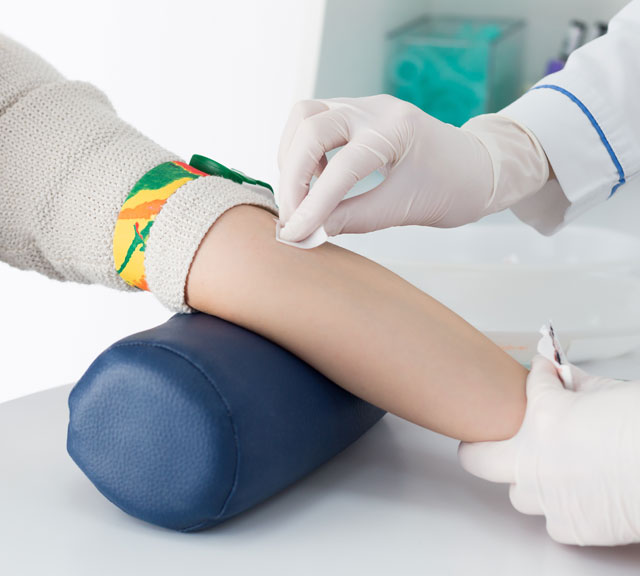Why Thyroid Disorders in Children Need Action Now

Find Your Perfect Match
Answer a few questions and we'll provide you with a list of primary care providers that best fit your needs.
Your child’s thyroid may be small, but it has an important job. It produces the thyroid hormones T3 and T4 that can affect brain development, growth and bone development, and metabolism. If this gland at the base of the neck pumps out too much or too little of those hormones, your child may run into problems.
An overactive thyroid produces too much thyroid hormone. This is called hyperthyroidism.
An underactive thyroid produces too little thyroid hormone. This is called hypothyroidism.
Both of these conditions occur more often in girls than in boys.
Left untreated in children, a thyroid disorder can lead to serious health issues. Fortunately, treatments are readily available and are very effective. With treatment, your child is likely to lead a healthy, normal life.
The thyroid gland is part of the body’s endocrine system. So a child with a thyroid disorder will be treated by a doctor called an endocrinologist who specializes in that body system.
Read on for details about both of these thyroid disorders, and what to expect if your child is affected by either one.
What Causes a Thyroid Disorder?
An overactive thyroid (hyperthyroidism) can be caused by:
- An autoimmune disorder called Graves disease
- Thyroid nodules
- Inflammation of the thyroid, called thyroiditis
An underactive thyroid (hypothyroidism) can be present at birth (congenital), or can develop later in life during childhood, the teen years or in adulthood.
Hypothyroidism that develops later in life can be caused by:
- An autoimmune disorder called Hashimoto’s disease
- Inflammation of the thyroid, called thyroiditis
- Surgical removal of part or all of the thyroid
- Radiation treatment of the thyroid
- Some medicines
Less often, hypothyroidism may result from too much or too little iodine in the diet or from pituitary disease.
What Are the Signs and Symptoms of Thyroid Disorder?
Signs of an overactive thyroid include:
- Nervousness or irritability
- Fatigue or muscle weakness
- Trouble tolerating heat
- Trouble sleeping
- Shaky hands
- Rapid, irregular heartbeat
- Frequent bowel movements or diarrhea
- Weight loss
- Mood swings
- Enlarged thyroid gland
A different set of symptoms may suggest an underactive thyroid:
- Extreme fatigue
- Feeling cold
- Constipation
- Dry skin
- Hair loss
- Poor or slowing growth
- Slight weight gain of no more than 5-10 pounds
- Delay in developing at puberty
- For girls, irregular menstrual periods
- Enlarged thyroid gland
With treatment, your child is likely to lead a healthy, normal life.
How Is a Thyroid Disorder Diagnosed?

Diagnosis can be challenging. Doctors often can’t diagnose an overactive thyroid based on symptoms alone because many of them also signal other diseases.
Because an underactive thyroid can develop slowly, and because these symptoms can also be attributed to other health issues, it sometimes is not detected early.
Doctors use the following to diagnose both of these conditions: medical history, physical exam, blood tests, and sometimes imaging tests such as a thyroid scan.
By law, all U.S. hospitals screen babies for thyroid levels at birth using a blood test.
What Happens if a Thyroid Disorder Is Left Untreated?
Untreated hyperthyroidism can cause serious problems with the heart, bones, muscles, menstrual cycle, and fertility.
Untreated hypothyroidism can cause intellectual disabilities and can affect a child's development, including sexual maturity. It can also lead to low activity levels, anemia, low body temperature and heart failure.
How Is a Thyroid Disorder Treated?
The goal of treatment is to bring thyroid hormone levels back to normal to prevent long-term health problems and to relieve uncomfortable symptoms.
Treatment depends on the cause of the condition and how severe it is.
For overactive thyroid, treatments can include the use of medicines, radioiodine therapy or thyroid surgery.
Underactive thyroid is most commonly treated using a thyroid hormone medication.
Your child’s doctor will monitor thyroid levels regularly via blood tests.
Taking thyroid medication may be part of your child’s daily ritual for many years or for a lifetime. Still, when children take medications as directed and have close follow-up with their endocrinologist, their thyroid disorder should be manageable their whole life through.
Find Your Perfect Match
Answer a few questions and we'll provide you with a list of primary care providers that best fit your needs.
Source: National Institutes of Health; American Academy of Pediatrics; EndocrineWeb




